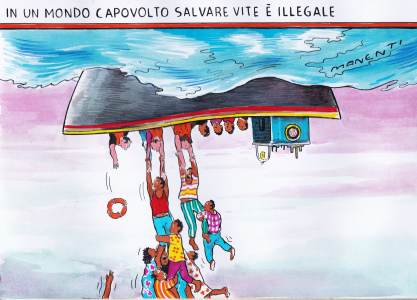Doctors for Human Rights (MEDU): the situation inside the Milo CIE (Immigration DetentionCentre) is explosive
(AGI) – Trapani, 6th Nov. – “There is an explosive situation in Milo which up until now has not been seen in other CIEs (Immigration Detention Centres). In the three hours which we remained inside the structure there were 10 escape attempts. Tensions and unrest are prevalent, the police are having to work in anti-riot gear.”
These are the words of Alberto Barbieri and Maria Rita Pega, from the Rome association “Doctors for Human Rights” who are speaking out against the current situation, after having visited the Milo CIE on the outskirts of Trapani. “There are two main reasons for the tense situation,” explained Barbieri, “The first is the long time which the migrants are finding themselves staying in the Centre. This is, on average 7 months, but depends on the health care management team, who have more authority than in other CIEs. The second reason is the absence of services and recreational activities. This is a knock on effect of the fact that the Oasi Cooperative, who run the Centre, won the contract this summer because they dramatically reduced their prices: the previous cooperative allocated €38 per migrant, while Oasi allow for just €27.” The doctors, who for safety reasons were not granted access to the areas where the migrants are actually held, also highlighted the insufficiency of the available psychological services. As it stands there is just one professional employed in this area because the other, “is on maternity leave until December.” Barbieri also pointed out an additional inadequacy, “When the migrants arrive at the Centre they do not receive a written copy of the regulations including their rights and their duties, which should be supplied to them in their own language. Instead, they are only informed of these things orally.” There are currently 133 migrants in the Centre, the vast majority of whom are Tunisian, 73 are seeking asylum. “28 of them have had their hearing, 13 of which have resulted in rejections,” continued Pega, “That’s a very high percentage of rejections.” During their visit, the two representatives of the association also met a young Tunisian who was unable to walk after injuring himself whilst attempting to escape on the 29th September. He had been taken back to the CIE even though he was still convalescing after fracturing both his heels. “In our opinion the young man’s condition is not compatible with staying in the CIE and we will highlight this to the prefecture,” stated the doctors. “The young man cannot walk, he is in a wheelchair and the presence of the Red Cross who assist him is only guaranteed in the morning. He is psychologically exhausted, this is not helped by the fact that he is living in a separate space to the others. He is alone and is unable to sleep at night due to the speaker system.” The CIE in Trapani was one of the final centres visited by the doctors as they travel around Italy. Tomorrow they will be at Caltanissetta and then Crotone, Brindisi and Modena (AGI).

